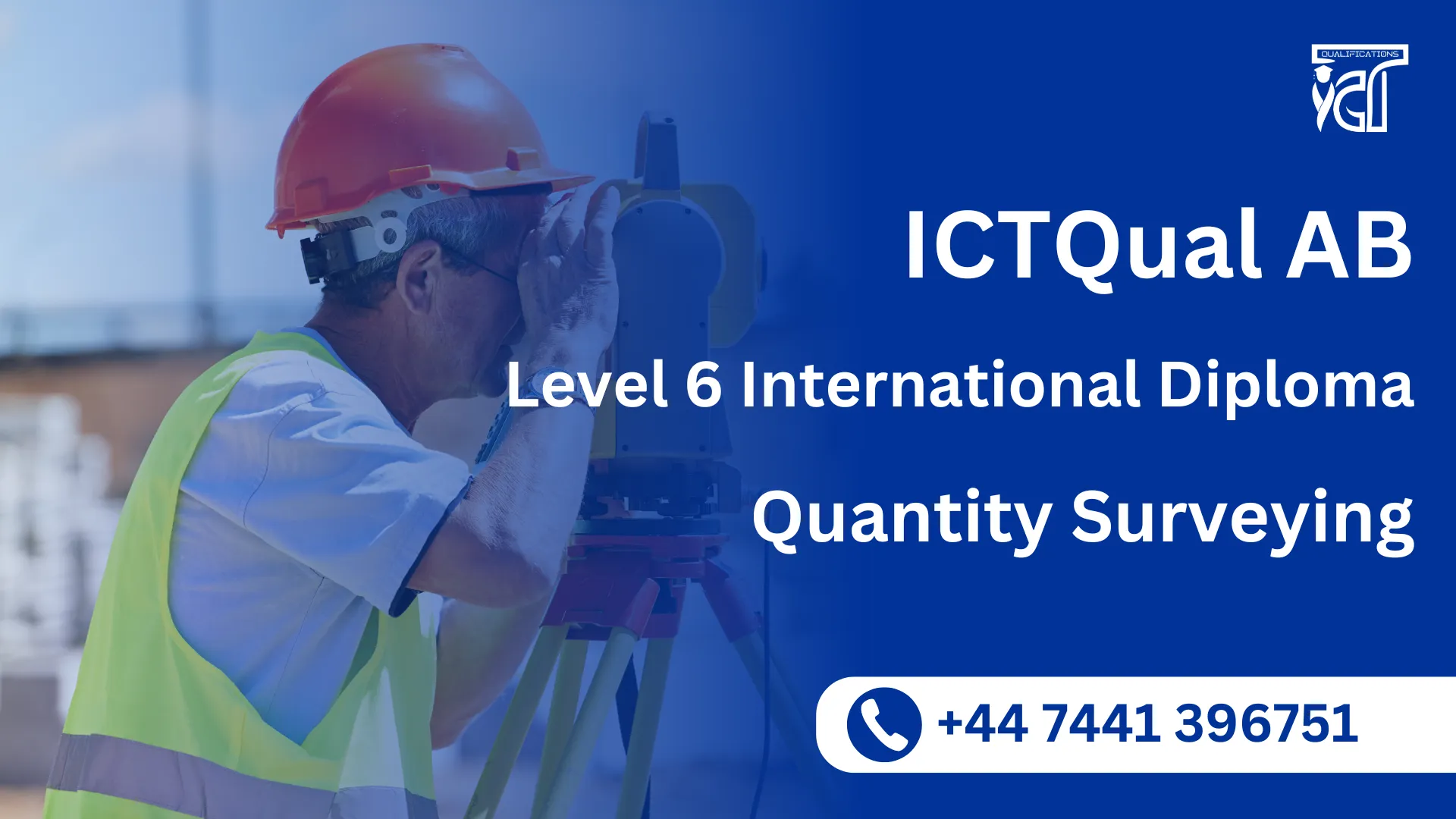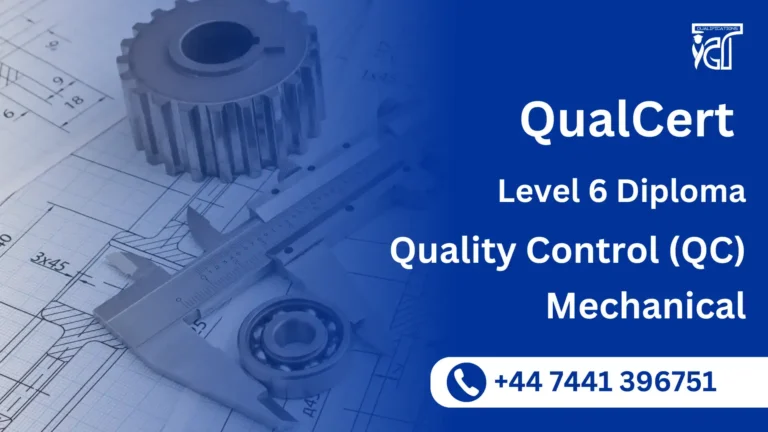The ICTQual AB Level 6 International Diploma in Quantity Surveying is a globally recognised qualification designed for learners aiming to excel in construction cost management and project estimation. Suitable for both freshers entering the construction and civil engineering sector and experienced professionals seeking career advancement, this programme provides the essential knowledge and skills to manage budgets, contracts, and resources efficiently.
Spanning three years and comprising 360 comprehensive credits, the diploma equips learners with advanced competencies in cost planning, procurement, contract administration, risk management, and project control. Learners gain practical insights into modern quantity surveying techniques and the latest industry standards, ensuring they are prepared for both local and international construction projects.
Graduates of this programme are well-positioned for diverse career opportunities, including Quantity Surveyor, Cost Consultant, Construction Project Manager, Contract Administrator, and Commercial Manager. Learners develop critical skills such as financial analysis, cost estimation, project budgeting, risk assessment, and effective stakeholder communication, enhancing their employability and leadership potential.
By completing this diploma, learners benefit from a qualification that provides professional credibility, practical skills, career advancement, and transferable competencies. The programme ensures readiness for the demands of the modern construction industry and equips learners for long-term success, international recognition, and rewarding career growth in quantity surveying and related sectors.
ICTQual AB Level 6 International Diploma in Quantity Surveying
This qualification, the ICTQual AB Level 6 International Diploma in Quantity Surveying, consists of 36 mandatory units.
Year 1 – Foundation in Quantity Surveying
- Principles of Quantity Surveying
- Introduction to Construction Projects
- Construction Materials and Methods
- Project Planning and Scheduling
- Risk Assessment and Management
- Health, Safety, and Environmental Awareness
- Project Communication and Stakeholder Management
- Construction Technology Fundamentals
- Financial Management in Construction
- Quality Assurance and Control
- Legal and Regulatory Frameworks in Construction
- Professional Ethics and Conduct
Year 2 – Intermediate Quantity Surveying Practices
- Advanced Project Planning Techniques
- Resource Management and Allocation
- Project Cost Estimation and Budgeting
- Construction Contract Administration
- Procurement and Supply Chain Management
- Project Risk Analysis and Mitigation
- Leadership and Team Management
- Site and Workshop Management
- Sustainability and Environmental Management
- Project Monitoring and Reporting
- Problem-Solving and Decision-Making in Projects
- Communication and Negotiation Skills
Year 3 – Advanced Quantity Surveying and Strategic Leadership
- Strategic Quantity Surveying and Project Management
- Advanced Construction Cost Planning
- Infrastructure Project Management
- Innovation in Construction Projects
- Advanced Risk and Crisis Management
- Contract Management and Legal Compliance
- Leadership in Construction Projects
- Advanced Project Control and Performance Measurement
- Project Governance and Compliance
- Research Methods and Project Analysis
- Capstone Project in Quantity Surveying
- Professional Development and Career Planning
Learning Outcomes for the ICTQual AB Level 6 International Diploma in Quantity Surveying:
Year 1 – Foundation in Quantity Surveying
Principles of Quantity Surveying
- Understand core quantity surveying concepts, methodologies, and terminology.
- Apply basic cost management principles to construction projects.
- Identify key roles and responsibilities within a quantity surveying team.
- Explore project life cycles and the significance of accurate cost estimation.
Introduction to Construction Projects
- Identify types and scales of construction projects.
- Recognise objectives, stages, and stakeholders involved in construction projects.
- Understand the roles of project managers, surveyors, and contractors.
- Analyse initial project feasibility and scope.
Construction Materials and Methods
- Describe properties, uses, and limitations of common construction materials.
- Understand standard construction techniques and methods.
- Evaluate material suitability for different project requirements.
- Apply best practices for material handling and sustainability considerations.
Project Planning and Scheduling
- Develop basic project plans with timelines, tasks, and milestones.
- Use scheduling tools to sequence construction activities effectively.
- Understand dependencies, critical paths, and resource allocation.
- Adjust plans to accommodate changes or delays.
Risk Assessment and Management
- Identify potential risks in construction projects.
- Apply risk assessment techniques and mitigation strategies.
- Develop basic contingency plans for identified risks.
- Monitor and review risk registers throughout project execution.
Health, Safety, and Environmental Awareness
- Demonstrate awareness of workplace health, safety, and environmental regulations.
- Apply safe practices in construction site operations.
- Conduct simple safety audits and hazard assessments.
- Promote sustainable and environmentally responsible practices.
Project Communication and Stakeholder Management
- Identify key stakeholders and their requirements.
- Communicate project information effectively to diverse audiences.
- Prepare basic stakeholder engagement strategies.
- Resolve minor conflicts and maintain collaborative relationships.
Construction Technology Fundamentals
- Understand applications of construction technology in quantity surveying.
- Evaluate technological solutions for efficiency and cost-effectiveness.
- Explore emerging digital tools in project management and surveying.
- Apply technology to improve reporting and project documentation.
Financial Management in Construction
- Interpret financial statements and project budgets.
- Apply cost control principles in planning and monitoring.
- Forecast expenditure and track variances.
- Understand funding requirements and financial decision-making processes.
Quality Assurance and Control
- Understand quality management systems and standards in construction.
- Implement basic quality control processes on-site or in project planning.
- Monitor adherence to specifications and performance requirements.
- Recommend improvements for continuous quality enhancement.
Legal and Regulatory Frameworks in Construction
- Understand statutory, regulatory, and contractual obligations.
- Apply compliance measures in project execution.
- Recognise legal risks and enforce obligations.
- Evaluate the impact of legislation on project outcomes.
Professional Ethics and Conduct
- Recognise professional ethical standards in quantity surveying.
- Demonstrate ethical decision-making in project scenarios.
- Promote integrity, accountability, and transparency.
- Understand responsibilities to clients, colleagues, and stakeholders.
Year 2 – Intermediate Quantity Surveying Practices
Advanced Project Planning Techniques
- Apply advanced planning methods to complex construction projects.
- Develop integrated schedules optimising resources and timelines.
- Analyse interdependencies and project constraints.
- Utilise project management software for planning and monitoring.
Resource Management and Allocation
- Manage human, material, and financial resources efficiently.
- Analyse resource requirements and allocation strategies.
- Monitor utilisation and productivity of project resources.
- Adjust resource plans to meet project objectives and deadlines.
Project Cost Estimation and Budgeting
- Prepare detailed cost estimates for construction projects.
- Monitor and control project expenditures effectively.
- Conduct cost-benefit analysis to support decision-making.
- Identify financial risks and implement mitigation strategies.
Construction Contract Administration
- Understand different types of construction contracts.
- Manage contractual obligations, deliverables, and timelines.
- Administer contract documentation and processes effectively.
- Resolve disputes and enforce compliance with contract terms.
Procurement and Supply Chain Management
- Plan procurement processes for construction projects.
- Select suppliers, manage contracts, and optimise supply chains.
- Monitor performance of suppliers and contractors.
- Ensure procurement aligns with project budgets and timelines.
Project Risk Analysis and Mitigation
- Conduct comprehensive risk analyses for intermediate projects.
- Develop and implement mitigation and contingency plans.
- Monitor project risks and evaluate mitigation effectiveness.
- Adjust strategies to minimise risk impact on project outcomes.
Leadership and Team Management
- Demonstrate leadership skills in project teams.
- Manage team dynamics and resolve conflicts effectively.
- Motivate and mentor team members for optimal performance.
- Foster collaboration, accountability, and high-quality output.
Site and Workshop Management
- Plan and supervise construction site or workshop operations.
- Ensure safety, compliance, and operational efficiency.
- Coordinate workforce, materials, and equipment effectively.
- Monitor daily operations and report progress to stakeholders.
Sustainability and Environmental Management
- Apply sustainable practices in construction projects.
- Evaluate environmental impacts and implement management strategies.
- Promote eco-friendly approaches to design, materials, and processes.
- Integrate sustainability considerations into cost and resource planning.
Project Monitoring and Reporting
- Track project progress against plans and objectives.
- Prepare clear and accurate progress reports.
- Analyse performance data to identify delays or issues.
- Recommend corrective actions to maintain project alignment.
Problem-Solving and Decision-Making in Projects
- Apply analytical techniques to resolve project challenges.
- Make informed decisions in complex scenarios.
- Evaluate alternative solutions for feasibility and impact.
- Document decisions and their outcomes for accountability.
Communication and Negotiation Skills
- Demonstrate effective verbal and written communication.
- Apply negotiation strategies to achieve project goals.
- Engage stakeholders in collaborative problem-solving.
- Resolve conflicts and secure agreement on project decisions.
Year 3 – Advanced Quantity Surveying and Strategic Leadership
Strategic Quantity Surveying and Project Management
- Develop strategic plans for complex construction and infrastructure projects.
- Align project objectives with organisational goals and industry standards.
- Analyse technical, financial, and operational factors influencing project success.
- Apply strategic planning tools to optimise project outcomes and resource utilisation.
Advanced Construction Cost Planning
- Prepare comprehensive cost plans for large-scale construction projects.
- Analyse cost drivers and implement effective budget control measures.
- Forecast expenditure and identify potential financial risks.
- Integrate cost planning with project scheduling and procurement strategies.
Infrastructure Project Management
- Plan and manage large-scale infrastructure projects efficiently.
- Address technical, logistical, and stakeholder challenges effectively.
- Implement operational and maintenance planning for infrastructure systems.
- Monitor performance to ensure projects are delivered on time, within budget, and to required quality standards.
Innovation in Construction Projects
- Identify opportunities for innovation in construction and surveying processes.
- Apply emerging technologies and best practices to project delivery.
- Foster a culture of creativity and continuous improvement within project teams.
- Evaluate innovative solutions for cost, efficiency, and sustainability impacts.
Advanced Risk and Crisis Management
- Conduct high-level risk analyses for complex construction projects.
- Develop and implement contingency and mitigation plans.
- Manage project crises to maintain operational continuity.
- Evaluate the effectiveness of risk management strategies and update protocols as needed.
Contract Management and Legal Compliance
- Understand and manage complex construction contracts effectively.
- Ensure compliance with statutory, regulatory, and contractual requirements.
- Negotiate and resolve contractual disputes professionally.
- Apply legal knowledge to minimise project liabilities and enforce obligations.
Leadership in Construction Projects
- Lead multidisciplinary teams to achieve project objectives.
- Motivate, mentor, and develop team members to enhance performance.
- Implement strategies for conflict resolution and team collaboration.
- Promote accountability, ethical conduct, and a results-driven culture.
Advanced Project Control and Performance Measurement
- Monitor and control project progress using advanced techniques.
- Measure performance with KPIs, benchmarks, and analytical tools.
- Identify deviations from project plans and implement corrective actions.
- Produce comprehensive reports for stakeholders and decision-makers.
Project Governance and Compliance
- Apply governance frameworks to ensure accountability and transparency.
- Ensure compliance with industry standards, regulations, and contractual obligations.
- Establish monitoring and reporting mechanisms to maintain governance oversight.
- Review and improve project governance practices for continuous improvement.
Research Methods and Project Analysis
- Conduct research to support evidence-based decision-making in quantity surveying.
- Analyse project data to improve planning, execution, and cost management.
- Apply statistical and analytical tools to interpret findings effectively.
- Present research outcomes in clear, professional reports for stakeholders.
Capstone Project in Quantity Surveying
- Integrate knowledge and skills from all programme units into a practical project.
- Demonstrate competence in project planning, cost control, and risk management.
- Apply leadership and team management skills in a real-world context.
- Produce a professional project report and presentation demonstrating problem-solving and strategic decision-making.
Professional Development and Career Planning
- Develop a personal career plan aligned with quantity surveying and project management goals.
- Identify opportunities for lifelong learning and professional growth.
- Reflect on strengths, weaknesses, and areas for development.
- Set realistic goals to advance career prospects in construction and surveying sectors.
The ICTQual AB Level 6 International Diploma in Quantity Surveying equips learners with the knowledge, skills, and practical expertise required to excel in the construction and civil engineering industry. This programme enhances professional credibility, improves employability, and prepares learners for leadership roles in quantity surveying and project management.
1. Global Industry Recognition
- Gain an internationally recognised qualification that strengthens your professional credibility.
- Enhance employability for roles in construction, civil engineering, and project consultancy sectors.
- Open doors to local and international career opportunities across multiple industries.
2. Advanced Quantity Surveying Skills
- Develop expertise in cost planning, procurement, contract management, and project budgeting.
- Learn risk assessment, financial analysis, and project control techniques applicable to real-world projects.
- Gain practical knowledge of modern quantity surveying tools and industry standards.
3. Career Advancement and Opportunities
- Qualify for senior roles such as Quantity Surveyor, Cost Consultant, Contract Administrator, or Construction Project Manager.
- Strengthen your profile for promotions, international projects, and leadership positions.
- Use the diploma as a stepping stone for further studies or advanced certifications.
4. Transferable and Practical Competencies
- Enhance strategic planning, negotiation, leadership, and decision-making skills.
- Develop effective communication and stakeholder management abilities.
- Acquire versatile skills applicable across construction, infrastructure, and engineering sectors.
5. Long-Term Professional Value
- Complete a 360-credit, three-year qualification that demonstrates commitment and expertise.
- Future-proof your career by staying aligned with modern construction and project management trends.
- Build a strong foundation for sustainable career growth and international recognition.
The ICTQual AB Level 6 International Diploma in Quantity Surveying is designed for learners who are motivated to build or advance their careers in the construction and civil engineering industry. This programme caters to both freshers seeking foundational knowledge and experienced professionals aiming to formalise and enhance their skills.
1. Fresh Graduates and Career Starters
- Learners with a background in quantity surveying, civil engineering, construction management, or related technical fields.
- Individuals seeking practical knowledge, industry insights, and employable skills to secure entry-level or junior roles.
- Those looking for an internationally recognised diploma to strengthen career prospects in construction and project management.
2. Experienced Professionals
- Learners with 6+ years of verifiable experience in quantity surveying, project management, or construction cost management.
- Professionals aiming to formalise prior experience through Recognition of Prior Learning (RPL) and fast-track certification.
- Individuals seeking senior or managerial positions in local or international construction projects.
3. Aspiring Project Managers and Team Leaders
- Learners preparing to take on leadership roles in construction, cost management, or project consultancy.
- Individuals seeking advanced skills in budgeting, procurement, contract management, and risk assessment.
- Professionals aiming for long-term career growth, promotions, and international project opportunities.
4. Globally Focused Learners
- Learners looking to work on international construction projects and adhere to global industry standards.
- Those who value transferable skills such as strategic planning, leadership, and stakeholder management.
- Individuals committed to completing a three-year, 360-credit programme to enhance professional credibility and career mobility.
Completing the ICTQual AB Level 6 International Diploma in Quantity Surveying equips learners with advanced expertise and opens multiple pathways for academic and professional growth. This internationally recognised qualification ensures learners are prepared for leadership roles and global opportunities in the construction and civil engineering sectors.
1. Academic Progression
- Progress to Level 7 Diplomas or postgraduate qualifications in quantity surveying, construction management, or project management.
- Pursue a Master’s degree (MSc or MBA) in construction management, project management, or related disciplines.
- Specialise in advanced areas such as sustainable construction, infrastructure planning, or cost consultancy.
2. Professional Career Advancement
- Qualify for senior roles such as Quantity Surveyor, Cost Consultant, Construction Project Manager, Contract Administrator, or Commercial Manager.
- Gain eligibility for international assignments, consultancy projects, and leadership positions within construction and civil engineering firms.
- Enhance competitiveness for promotions, salary growth, and global career opportunities.
3. Professional Certifications and Memberships
- Build a strong foundation to pursue professional memberships or certifications in quantity surveying and construction management associations.
- Strengthen eligibility for credentials such as Chartered Surveyor (RICS) or other recognised project management certifications.
4. Entrepreneurial and Consultancy Opportunities
- Use acquired expertise to establish a consultancy or advisory service in construction cost management and project planning.
- Support organisations with project budgeting, procurement, and contract management solutions.
This diploma ensures learners are well-positioned for long-term success, international recognition, and a rewarding career in quantity surveying and related sectors.
As an approved centre of ICTQual AB, we are authorised to deliver and assess the Level 6 International Diploma in Project Management in Mechanical. Learners must enrol directly with us to access official ICTQual AB resources, tutor support, and certification. To suit different levels of experience, we offer two certification routes:
Route 1 – Experienced Professionals
This pathway is tailored for mechanical engineering and project management professionals with a minimum of six (6) years of verifiable, relevant work experience.
- Evidence of Experience: Candidates must submit employer verification letters, project portfolios, or references to confirm their expertise.
- Assessment Method: Recognition of Prior Learning (RPL) and competency-based evaluation will be used to validate your skills.
- Fast-Track Certification: Your extensive industry experience allows you to achieve the diploma without completing all coursework.
- Ideal For: Senior engineers, project managers, operations leads, and consultants seeking international recognition.
Route 2 – Fresh Candidates / New Entrants
This route is designed for learners who are new to mechanical project management or are early in their careers.
- Assignments Requirement: Fresh candidates must complete 36 structured assignments covering all study units of the diploma.
- Skill Development: Assignments include practical tasks, case studies, and scenario-based exercises to build in-depth understanding.
- Full Tutor Support: Our experienced mentors will provide guidance, feedback, and resources to help you succeed.
- Ideal For: Recent graduates, junior engineers, or professionals looking to transition into mechanical project management roles.
Enrolling with us ensures your qualification is ICTQual AB-approved, internationally recognised, and aligned with the latest mechanical project management standards for global employability and career growth.
Entry Requirements
To enrol in the ICTQual AB Level 6 International Diploma in Quantity Surveying, learners must meet the following criteria to ensure they are prepared for the academic and practical demands of this advanced programme:
1. Minimum Age
- Learners must be 18 years or older at the time of enrolment.
2. Educational Background
- A Level 5 Diploma or equivalent qualification in quantity surveying, construction, civil engineering, or a related technical field.
- Alternatively, a Bachelor’s degree in quantity surveying, construction management, or related disciplines.
- Learners without formal academic qualifications may still apply through the experienced professional route if they meet the experience requirement.
3. Professional Experience
- Experienced Professionals Route: At least 6 years of verifiable, relevant work experience in quantity surveying, construction cost management, or related sectors.
- Freshers Route: No prior experience required but learners must complete 36 structured assignments to demonstrate competence.
4. Language Proficiency
- Learners must have proficiency in English to complete assignments and assessments effectively.
- Non-native speakers should provide evidence of language proficiency (e.g., IELTS 5.5 or equivalent) or pass an internal language assessment.
Register Now
Qualification Process
Qualification Process for the ICTQual AB Level 6 International Diploma in Quantity Surveying
- Self-Assessment:
Begin by evaluating your eligibility to ensure you meet the qualification requirements, including work experience, knowledge, and language proficiency. - Registration:
Complete your registration by submitting the required documents, including a scanned copy of a valid ID, and paying the registration fee. - Induction:
An assessor will conduct an induction to confirm your eligibility for the course and explain the evidence requirements. If you do not meet the criteria, your registration will be cancelled, and the fee will be refunded. - Assignments & Evidence Submission:
Provide all assignments and the necessary evidence based on the assessment criteria outlined in the course. If you are unsure of the required evidence, consult with the assessor for guidance on the type and nature of evidence needed. - Feedback and Revision:
The assessor will review your submitted evidence and provide feedback. Evidence that meets the criteria will be marked as “Criteria Met,” while any gaps will be identified. You will be asked to revise and resubmit if needed. - Competence Evidence:
Submit final evidence demonstrating that all learning outcomes have been met. This evidence will be marked as “Criteria Met” by the assessor once it is satisfactory. - Internal Quality Assurance (IQA):
The Internal Quality Assurance Verifier (IQA) will review your evidence to ensure consistency, quality, and compliance with standards. - External Verification:
The IQA will submit your portfolio to ICTQUAL AB External Quality Assurance Verifiers (EQA) for final confirmation. The EQA may contact you directly to verify the authenticity of your evidence. - Certification:
Upon successful completion of all checks, ICTQUAL AB will issue your official certificate, confirming that you have attained the ICTQual AB Level 6 International Diploma in Quantity Surveying.







